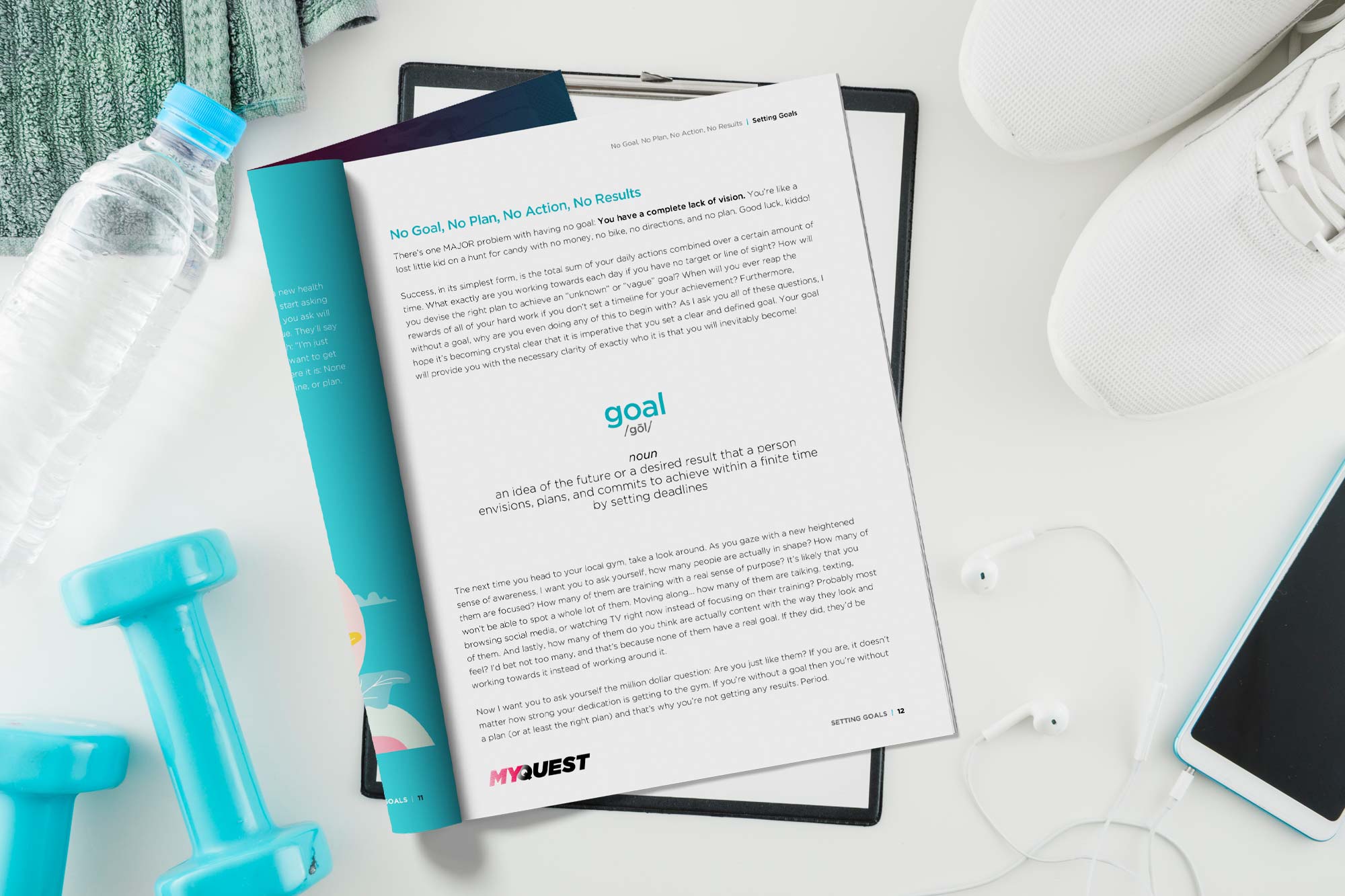
When you’re a beginner or novice, the logic seems simple: the more often you train, the more results you’ll gain. And though there is some truth to this, it certainly isn’t the entire story. With that being said, what is the ideal workout frequency? Although there’s no “one-size-fits-all” answer, I’ll start off by saying this:
The Short Answer:
For the average person wanting to take their fitness goals seriously, the ideal training frequency would be between 3–5 days per week for 60–90 minutes per session. This is a realistic workout regimen that most people can stick to and will produce the most optimal results no matter what one’s fitness goal is — general health or ultra lean aesthetics.
Still confused? Want to narrow these ranges down to something more exact? Well, how often YOU should workout depends on a number of factors, such as your goals, schedule, and fitness level, all of which we will cover in great detail in this article.
Work Out as Much as You Can Handle
And for you crazies out there, I mean physically; NOT mentally.
Also, notice that I didn’t say, “Work out as much as you’d like.” Because for some of you that would mean every day, multiple times per day, multiple hours per day. Unfortunately, that isn’t the best idea; especially if your training intensity tends to be high.
Your body is bio-mechanical, but mechanical nonetheless. Like all pieces of machinery, your body only has a set amount of work it can perform before it becomes inefficient or “inoperable” due to some form of a mechanical breakdown.
Where machinery breaks down in the form of wear-and-tear, buckling, seizing, overheating, and corrosion, we, humans, show signs of mechanical break down in more “human” ways: fatigue, stress, sprains, strains, tears, pain, inflammation, etc.
The truth is that the human body can only handle so much. More important, your body has specific limits itself. So the key is figuring out what your threshold is and then working out within it.
By the end of this article, my hope is that you’ll have a better understanding of all the various determining factors that have an effect on your training regimen, why less can sometimes actually be more, how to choose the most effective workout frequency, and how to respect your body in general.
When you’re done reading, leave a comment down below to let me know if I succeeded with that. And if I didn’t, don’t be afraid to let me know that too! My goal is to constantly improve these articles over time so that they can help more people. 😃
Here’s exactly what we’ll cover in this article:
Feel free to use the navigation box above to skip ahead at your leisure. However, as always, for added perspective, I highly suggest that you read it all.
Rule #1: Don’t Train Every Day
First, let’s begin by discussing how often NOT to work out.
Anyone reading this right now who does train every day is probably mad at me right now. That’s okay! I feel your pain and frustration… or at least I used to.
The truth is, I used to work out every single day, sometimes multiple times per day, but now I don’t. Now I only work out 3–4x per week and guess what? My body looks and feels better now than it ever did in the past. And I’m a happier person now, too. 😃
There are a number of reasons why I’m telling you not to train daily, but the most important idea that applies to almost everyone is this: you’ve got better s#!% to do!

Life is busy and full of obligations: work, family, friends… I’ll just stop there because those things alone are usually already a handful for most.
If you agree and you’re already sold on rule #1, then click here to skip ahead.
If that wasn’t reasoning enough or you’d just like to have a better understanding of my logic behind why I think it’s unhealthy, let’s continue:
“Overtraining” Is Absolutely a Real Thing
For those who are new or simply unaware, overtraining occurs when an individual engages in more physical training or exercise than his or her body has time to recover from, which results in a decrease in overall performance.
There are numerous contradicting arguments and studies that go back and forth on whether or not overtraining is a real thing. Well, I’m here to tell you that it is.
After training for 15+ years, there comes a point where your personal experience outweighs everything else — including scientific research. At this point in my life, I’m SUPER in tune with my body.
In the past, I’ve felt most of the obvious effects of overtraining. And ever since I started managing my workload in the gym, on the track, on the tennis court, and everywhere else in life, none of the symptoms of overtraining have ever resurfaced.
And that, my friends, is how I know it’s real.
Here are all of the symptoms I personally experienced when I was overtraining:
- Sudden plateau or noticeable decline in my performance
- Low self-esteem or I’d just seem to feel like s#!%
- Trouble falling asleep at night (minor insomnia)
- Other times I’d sleep WAY more hours than usual (11–12 hours)
- Major decrease in my libido (low sex drive)
- Frequent annoying and aggravating injuries
- Constantly getting sick and catching colds
Here’s the thing, everyone is going to experience the negative side effects of overtraining entirely differently. So the best advice I can give you is this:
“Learn to listen to your body!”

At this point in my life, I’m SUPER in tune with my body and when it talks to me, you better believe I listen.
When you feel like something is just “off”; when your energy suddenly feels “heavier” than normal; when you start sleeping for way longer than usual; or when you experience ANYTHING out of the absolute norm; your body is trying to tell you something.
The more you fight against the concept that overtraining is real and continue to push yourself to the absolute limit when your central nervous system is taking a beating, the s#!%tier you’re going to feel in the long run.
Eventually, you’ll hit the wall, wind up getting really sick, and be forced to take mandatory time off of the gym and all of your workouts — it’s inevitable.
If, instead, you’re proactive and you get sufficient rest, you can stay healthy and train consistently without the risk of any side effects or time away from doing what you love.
There Are No Added Benefits To Daily Training
Around 10 years ago or so, I used to be an avid gym-goer myself. In fact, I was so determined to make it to the gym that if I couldn’t and didn’t make it on any given day, I’d get SO upset!
I couldn’t admit it then, but I can admit it now — I was literally obsessed! And you might be thinking to yourself, “That sounds like a GREAT problem to have! I wish that was me!” Trust me: no you don’t!
These everyday gym-goers probably won’t admit this to you, but there is a certain level of “crazy” associated with going to the gym EVERY single day. 🤪
Now, don’t get me wrong…
If you’re someone who’s SUPER stressed out (maybe even depressed) and you’re using daily physical activity to combat against the negative effects that life is having on your overall mental health, then by all means… train, train, train away! 💪
To be honest, at the point that going to the gym becomes almost an addiction — as it was with me at one point — I think it’s safe to say that working out is no longer a “healthy” practice; not mentally, anyway.
Furthermore, training every day, specifically if you’re just doing it as part of living a healthy lifestyle, doesn’t provide any additional health benefits!
In fact, most people that I know who train every day — and who aren’t borderline “crazy” — really only do it for one reason and one reason only: to counteract the effects of their excessive and/or poor eating habits.
This is the oldest mistake in the book since everyone knows:
“You can’t out train a bad diet.”
The morale of the story is to never, EVER, under any circumstances, substitute more exercise for poor nutrition or uncontrollable eating. If that’s legitimately your only reasoning for wanting to train so frequently, please just quit while you’re ahead. 😄
You have to get your eating in check first! This is critical! You can’t just train every day for the rest of your life as a means of offsetting your irresponsible nutritional habits. You’re simply applying a band-aid to an even BIGGER issue. 🩹
While we’re on the topic of nutrition, if you’d like to know exactly how many calories to eat daily to hit your specific goal based on a realistic workout regimen — one that’s sustainable for the long run — check out our easy-to-use Calorie Calculator. 👈
Calorie Calculator
Want to know exactly how many calories you need to reach your fitness goal? We’ve got a calculator that does that for you!
Finally, if you’re one of those people who like to challenge this further by saying things like, “But athletes practice, train, and play hard EVERY single day!”
I’ve got news for you…
PRO Athletes Recover Just as Hard as They Train
Let me sum this section up in one line:
Lebron James spends $1.5 million per year just to take care of his body. 👈
Case dismissed. 😎
Seriously though, if you’re super competitive by nature, you’re training for a special event, or you’re just gung-ho about being active and you MUST train every single day, then you’d better be implementing some SERIOUS recovery measures.

That includes getting adequate sleep, stretching, icing, foam rolling, cupping, massage therapy, cryotherapy, fascial release therapy — and the list goes on. 🧊
A lot of these things can actually be performed by yourself, but rarely does anyone have the discipline — though most will argue the time — to make sure it all gets done.
And the point is, if you’re not recovering like an athlete, then your body is certainly not going to perform like an athlete’s. Unfortunately, it will undoubtedly break down at some point, and that’s practically a promise, unless you’re some sort of anomaly. 🤕
Since you’re not getting paid to train, wanna know the simple “fix”? Don’t train every day.
The ONLY Exception to the Rule: Low-Intensity Training
Naturally, if your daily workouts consist solely of low-intensity exercise such as walking, light jogging, swimming, water aerobics, Tai-chi, or yoga, for example, then — by all means — feel free to go absolutely nuts!
Otherwise, if you’re training with a higher frequency for longer durations at higher intensity levels, you’ll require more recovery time. Period.
The Bottom Line:
Don’t train every single day, unless you absolutely must with good reason. When it comes to working out, as you’ll soon discover, less is often more.
Choosing the Right Workout Frequency
Now that you know how often NOT to work out, let’s help you figure out the ideal workout frequency for your specific lifestyle.
As promised at the beginning of this article, here are the 3 major determining factors:
- your goals
- your schedule
- your fitness level
How Extravagant Are Your Fitness Goals?
One of the biggest deciding factors for how frequently you should work out, as well as how intensely you should work out, is the specificity of your fitness goals.
Have you set a goal? Do you know exactly what you want to achieve? Do you know what you want to look like? Do you need to hit this goal by a specific date? Answering these questions will auto-determine the amount of time you will be required to invest.
If you’re struggling to answer ANY of these questions right now, then you desperately need to read our free Mindset Guide. 👈

Need help finding clarity on your goals?
Download our free Mindset Guide! You’ll learn: How to set meaningful goals and why it’s so important for your success.
We 100% respect your privacy and will never, EVER, share your personal information or spam you — no B.S.
For example, if your main goal is to have extremely low body fat and a jaw-dropping physique, you will be training much more frequently — likely 3–5 times per week for 60–90 minutes each workout. 😨

Compare this to someone who has a more mainstream goal of just staying in generally good shape for better overall health; they might only be training 2–3 times per week for 30–60 minutes each session.
Also, if you’re attaching a limited timeline to reach a more distant goal — losing a significant amount of weight for an upcoming wedding, for example — your workout frequency could reach upwards of 5–7 days per week for 1–2 hours per session.
Training programs like this may cause you to burn out before you even reach the end of your goal. As such, it’s always advisable to approach any major fitness goal with the following mindset:
“This is a marathon, not a sprint.”
This is also why it’s so important to determine what your primary goal is before you even start your fitness journey. You need to know A) if this goal is something you’re ready to take on; and B) whether or not you have the bandwidth (time and energy) to commit to it.
Speaking of which…
How Much Free Time Do You Have in Your Schedule?
Better question: How much free time do you REALISTICALLY have in your schedule? Keep it real with yourself here because consistency is the key to achieving your goals.
One of the biggest mistakes people make, especially when setting new year’s resolutions, is jumping into a workout regimen without thinking of the consequences that it’s going to have on their overall time and energy.
If you’re replacing a s#!% tonne of idle time, such as watching TV or browsing social media, with workout sessions, then you shouldn’t really have any problems here.
If you’re pulling crazy overtime hours at work, however, and you’ve got a jam-packed schedule with a little one waiting at home who’s eager for quality time, then let’s be real: free time isn’t going to just “create itself” for you magically!

As Frank Sinatra so eloquently put it:
“Something’s gotta give!”
You’ve got to figure out a logical way to make this all work. If you start committing to 5 days per week in the gym and other areas of your life begin to suffer — family, finances, sleep, sex life 😳 — then you’re not going to stick to this for very long.
That’s right! Contrary to popular belief, the level of enjoyment of your workouts isn’t what helps you stay consistent. In fact, I probably only enjoy going to the gym 20–30% of the time. The rest of the week I’m just doing what’s necessary for my goals.
The real key to staying consistent is this: you need a training program that’s REALISTIC for your lifestyle. It doesn’t have to be perfect; it just has to make sense!
Think about it: For many of us, waking up every morning at 6:00 am and dragging ourselves out of bed to go to our non-dream job isn’t exactly an “enjoyable” process. 😒
However, if that same job has good hours, a decent commute, respectable pay, fun and entertaining coworkers, daily tasks that don’t drive you absolutely nuts or stress you out, you’ll stick it out each week for the end reward! 💰
Your workout regimen is exactly the same!
At the end of the day, if your training schedule fits into the rest of your life seamlessly and effortlessly, without feeling like you’re giving up everything, it’ll be much easier to stay consistent in the long term.
If that means only working out twice per week, then only work out twice per week! Build a solid training program around two sessions per week and HULK SMASH those two workouts with absolutely EVERYTHING you’ve got each and every week. 👊😠
The Takeaway:
If your workout frequency is minimizing your productivity or making you unhappy in other IMPORTANT areas of your life, simply lower the frequency and duration of your workouts until you find perfect (or as close to) harmony and balance.
What Kind of Shape Are You Currently In?
If you’ve been sitting on the couch watching TV for the past 10 years only dreaming about starting a new fitness program and now you’re actually ready to begin, yay for you! 🥳
But don’t just jump right into it today and start training 2 hours per day, 5 days a week! That’s the fastest way for you to end up as a statistic and quit after your very first week.
If you’re a TOTAL beginner, instead, start off training 2–3 times per week for 30–60 minutes per session and gauge how you feel from there. If that feels like a good start, maintain this for 4–6 weeks. If not, scale it back a bit.
Most importantly, I repeat:
“Listen to your body!”
You’ll be pretty sore during your first few weeks as your body begins adapting to the new adjustments. Don’t just go super crazy and scare yourself away from the gym forever. 😄 Ease your way into it!
Once you’re in a groove and you start getting in better shape, you can start raising your sessions by 15–30 minutes and add in an extra day or two where needed. Again, more importantly, keep your frequency in line with your goals and schedule.
If on the other hand you’re a novice or intermediate in relatively good shape and you just want to step things up a bit, you really shouldn’t have a problem training 3–5 times per week for 60–90 minutes per session.
In fact, that’s probably the ideal training frequency and duration for just about anyone who’s got any sort of meaningful or above average fitness goals. 💪
Furthermore, unless you’re training for a competition, have very specific aesthetic or physique goals, OR are an athlete doing sport-specific training and conditioning, that should pretty much be the absolute maximum amount of time you train each week.
Spend any additional time on rest and recovery. 😴
The Takeaway:
First, plan your workout regimen around your goals and availability, then be realistic about what your body can actually handle based on your fitness level.
A Final Word of Advice
Before I let you go, I want to tell you something important: Do NOT let your training frequency in the gym define who you are.
Being active is obviously an important part of life. And if you have any interest in living a long, healthy, and fulfilling life, it should undoubtedly be top 5 on your daily to-do list.

With that being said, don’t get in the habit of beating yourself up mentally if you miss a gym day or two. Perfect gym attendance doesn’t make you a better person; giving it all you’ve got, whenever that’s possible, makes you a better person.
I, myself, have trained like an absolute maniac in the past chasing single digit body fat, ultra shredded muscles, and washboard abs only to feel tired, stressed out, alone… and EXTREMELY hungry. 😄
It’s SO much more important to pay attention to how you feel!
Do you feel healthy? Are you sleeping well? Do you feel strong and empowered? Can you climb a flight of stairs without gasping for air? Are you happy with how you look in the mirror? Can you fit into your clothes and do you feel good fitting into them?
Trust me on this one: ALL of these things matter SO much more than obsessing over the amount of times you’re able to work out each week.
As important as being active is, there are also other important things in life. It’s imperative that you make time for ALL of the things you love as well. ❤️
If that means sacrificing how often you get to work out, so be it!
Last year, I took 36 weeks off of my gym training just to prove that to myself! Fast forward to today, and I’m right back where I left off — like I never left!
It’s okay to take unscheduled days off to make room for things that matter; it’s okay to take an extra rest day (or week! or month!) every once in a while, especially if your body is demanding it; it’s okay not to be perfect. You can always get back on the horse!
Need Help With Your Training Program?
Need some assistance building a program that doesn’t take over your entire life?
Not sure where to begin? Let us help you discover your path to better health.
In our online fitness coaching program we perform a comprehensive needs assessment and then build you a fully-customized fitness program tailored to your every need.
This includes the implementation of a completely personalized training program as we discussed here today, and much more.
If this sounds interesting to you, click one of the buttons below to get started:
Final Thoughts
If you’re an absolute gym addict, hopefully I’ve relieved you from your unhealthy obsession and the vicious effects of overtraining while simultaneously giving you your life back. 😄
If you’re new to training, hopefully I’ve prevented this from happening in the first place!
In all seriousness, ultimately, I think the key takeaways here are this:
- Definitely don’t train every day, unless you’re an athlete; it’s just not worth it
- Train as frequently as your specific goals require you to
- In that same breath, don’t allow your fitness goals to negatively affect other important areas of your life
- Learn to listen to your body; it’s always giving you important feedback
- Finally, choose the workout frequency that allows you to stay the most consistent
If you can follow these simple tips, soon enough you’ll figure out the perfect training frequency for YOU — your goals, your schedule, your lifestyle. And at the end of the day, that’s what this is all about, isn’t it?
I’m interested: What are your thoughts? Do you agree with me on any of this? Do you disagree with me? How many times per week do you train? How long do you train each session? What’s your reasoning why? Leave a comment down below and let me know!









